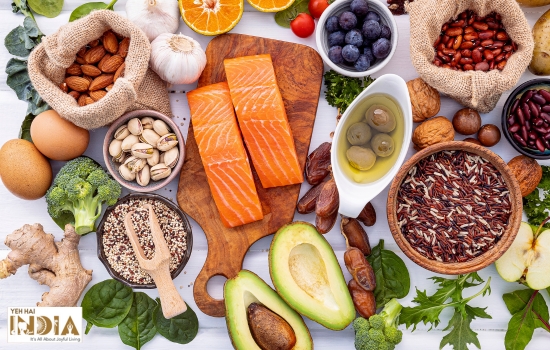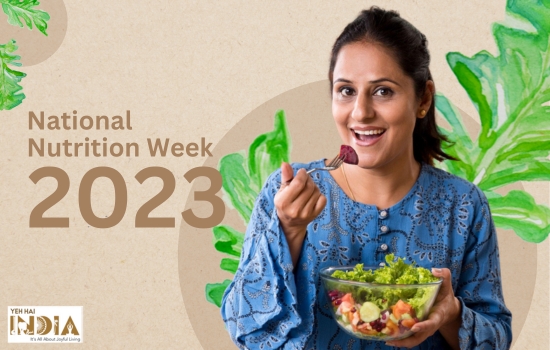Nutrition is the foundation of good health. National Nutrition Week is an annual event, celebrated in the first week of September (Sep 1 – Sep 7) of each year, that connects people all around the world to recognise the importance of nutrition in our lives. It’s a sobering reminder of the critical need of the hour, “eating healthy.”
This is not just for an individual; it is extremely important to have an understanding of nutrition as an entire community so that health can be passed on to future generations and not just short-lived wealth.
The Theme for National Nutrition Week 2023
This year’s National Nutrition Week 2023 has a theme that expresses a worldwide aspiration: “Healthy Diet Going Affordable for All.” This subject strikes a chord that resonates across varied cultures, locations, and socioeconomic strata in a world where food security and nutrition fairness remain critical issues. It crystallises the collective desire to make access to healthy, wholesome food a fundamental right for all people, regardless of their socio-economic standing.
As we look at the significance of National Nutrition Week 2023, we start on a journey that honours the universal desire for healthy lives as well as the collaborative efforts to make nutritious meals available to all, regardless of money, region, or background.
Many people struggle with what is as basic as food, which could be due to multiple factors or perhaps a single big factor like unaffordability.
Nutrition is more than simply a source of sustenance; it is the very foundation of existence. It serves as the foundation for our overall health and well-being.
The main aim of celebrating National Nutrition Week 2023 is to point out the essential importance of nutrition in our lives, generate awareness, and create a global understanding of the impact of nutrition on all aspects of existence, whether it is physical fitness, mental health, productivity, longevity, immunity, or levels of energy.
Recommended Article: Best Organic Food Brands In India 2023: Switch To A Healthy Life
Impact of Nutrition on Lives

Physical Fitness
Physical strength is essential for maintaining a healthy body weight, developing strong bones and muscles, and defending the immune system against illnesses.
Mental Health
Nutrients like omega-3 fatty acids, antioxidants, and more are crucial to promoting focus and cognition. The saying “you are what you eat” also applies to the brain!
Productivity
Physical stamina and mental health both demand a healthy body that comes from nutrition. A balanced diet is essential to growth and development and ensures better performance at work and in everyday life.
Longevity
Nutrition and lifespan are intricately related. A diet with all the essential nutrients is inevitable to prevent chronic illnesses and lifestyle diseases.
Immunity
To reduce susceptibility to sickness, it is important to have a properly working immunity system that could prevent the body from infections and strengthen it to work effectively and efficiently when needed.
Energy Level
Macronutrients like carbohydrates are the primary source of energy, not just for the body but for the brain as well. Nutritional compromise leads to lethargy and weakness that affect everyday tasks.
Recommended Article: Fortified breakfast cereals: Are they what they seem to be?
Challenges in Accessing Healthy Food
Nutrition, in a nutshell, is the compass that directs us towards a life of health, resilience, and fulfilment. It’s not only about survival; it’s about reaching our full physical and mental potential.
National Nutrition Week 2023 emphasises the importance of nutrition in our lives and urges us all to think about our shared goal of making “a healthy diet affordable for all.” It recognises that everyone, regardless of origin or situation, is entitled to the sustenance that is humanity’s birthright.
By addressing the affordability of healthy food, we aim to put down barriers to health and push individuals to make healthier choices. The topic emphasises our common obligation to build a society in which healthy eating is not a luxury but a universally available reality.
What are the challenges faced? 1. Food Insecurity Millions lack reliable access to sufficient, affordable, and nutritious food. 2. Rising Food Prices Costs of healthy items increase, pushing people towards cheaper, less nutritious options. 3. Limited Access to Fresh Produce Food deserts limit access to fresh fruits and vegetables in urban areas. 4. Transportation and Geographic Barriers Rural communities face issues reaching grocery stores due to transportation limitations. 5. Cultural and Dietary Preferences Cultural traditions may be overshadowed by less nutritious options. 6. Advertising and Marketing Unhealthy foods are heavily promoted, influencing consumer choices. 7. Lack of Nutritional Education Many lack the knowledge to make nutritious choices on a budget. 8. Income Disparities Low-income households struggle to allocate a budget for healthier options. 9. Environmental Factors Climate change impacts food production, affecting prices and access. 10. Government Policies Policies and subsidies affect food affordability and availability. 11. Limited Time and Convenience Fast-paced lifestyles favour convenience over healthy choices.
To overcome these challenges, many stakeholders must work together to ensure that everyone has equitable access to nutritious food.
Strategy for Minimizing Waste, Maximizing Nutrition

Despite these obstacles, several steps may be taken to make a nutritious diet cheaper and more accessible to everybody. Here are a few pointers that might help:
- Shop for healthy foods on a budget by buying non-perishables in bulk and looking for discounts and coupons while shopping at grocery stores.
- Cook at home more often to save both time and money. DIY cooking allows you to control ingredients and portion sizes while saving on dining out.
- Grow your food to get fresh, organic food at a fraction of the cost.
- Take advantage of food assistance programmes that are running to provide food assistance to people belonging to low-income groups.
- Get involved in your community to learn more about new and different ways that can help you indulge in healthy eating practices. Extend help where you can bring about change by generating awareness.
- Meal Planning: Plan your meals to minimise food waste and make the most of your budget.
- Buy in bulk: Purchase non-perishable items in bulk to save money over time.
- Local and seasonal: Opt for locally grown and seasonal produce, which is often more affordable and fresher.
- Plant-Based Proteins: Incorporate more plant-based proteins like beans, lentils, and tofu—they’re cost-effective and healthy.
Sometimes little, wiser steps towards affordability and accessibility can improve health and well-being regardless of anyone’s background.
Affordable and Healthy Food Options
We can pave the way to a healthier and more cost-effective future by making little improvements. It is always crucial to have access to low-cost, nutrient-dense meals that may help you keep healthy without straining your pocket.
Nutrient-Rich Food Description and Use Oats Rich in fibre, vitamins, and minerals. Ideal for oatmeal or smoothies. Beans and Lentils Economical protein, vitamins, and fibre sources. Great for soups, stews, and salads or as a meat substitute. Eggs Affordable source of high-quality protein. Versatile for various meals. Bananas Budget-friendly source of potassium and fibre. Ideal as a snack or added to yoghurt or oatmeal. Canned Tuna Cost-effective lean protein with omega-3s. Great for sandwiches, salads, or pasta. Frozen Vegetables Affordable and nutritious, perfect for stir-fries, soups, or side dishes. Whole Grains or Millets Budget-friendly with essential nutrients and fibre. Choose whole-grain options. Peanut Butter Source of healthy fats, protein, and fibre. Spreads well on bread or adds to oatmeal. Cabbage Economical cruciferous veggies are rich in vitamins and fibre. Suitable for coleslaw or stir-fries. Yoghurt Affordable protein and probiotics source. Enjoy with fruits or in smoothies. Roots and tubers like Carrots & Sweet Potato Low-cost, loaded with vitamins and fibre. Healthy snack or addition to salads and stews. Roast, mash, or use in various dishes. GLVs like Spinach, amaranth, etc. Nutrient-dense and budget-friendly. Perfect for soups, and pasta dishes. Canned Vegetables Practical and affordable veggie options for casseroles, stews, or soups.
Conclusively,
Sustainable eating practices include decisions that assist the environment while also contributing to healthier and more economical diets.
One important component is eliminating food waste, which not only saves resources but also money.
Meal planning, innovative use of leftovers, and portion control may all help to prevent waste.
Choosing locally sourced foods also helps to support local economies while lowering the carbon footprint associated with transportation.
These items are frequently more nutritious, fresher, and less costly than their long-distance equivalents. We can strike a balance that benefits our health, our finances, and the earth by adopting sustainable practices in our eating habits.
You can enhance your diet without breaking the bank if you follow the guidelines listed above and practice sustainable eating habits. Make educated decisions and understand that healthy eating doesn’t have to be necessarily expensive.
Simple yet substantial changes can have a huge impact on both health and money.
Recommended Article: 15 Best Foods for Healthy, Clear, and Glowing Skin










